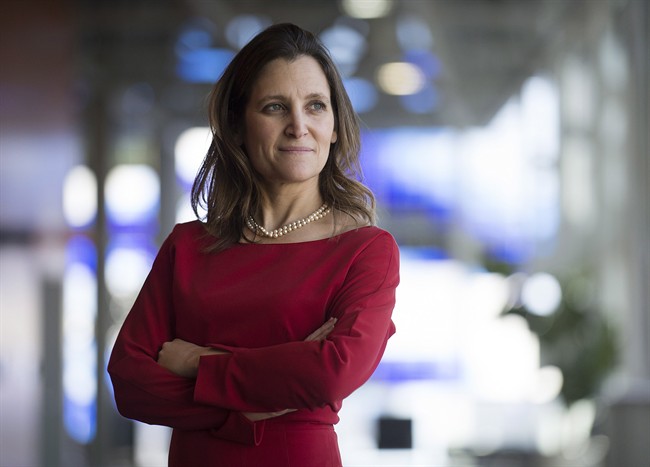Foreign Affairs Minister Chrystia Freeland says her government is closely monitoring “the homefront” as alleged Russian interference in the American political process continues to make headlines south of the border.

In an interview with Global News’ Eric Sorensen, Freeland said the threat of cyberespionage and interference in Canada’s own elections is quite real.
READ MORE: Russia targeting U.S. midterm elections, intelligence officials say
“That is an issue that our government takes extremely seriously, and that I think Canadians take extremely seriously,” Freeland said.
“I think we need to be very mindful about taking care of the homefront, and in particular being very, very mindful of the ways in which there have been efforts to undermine the democratic process in other countries.”
The minister, who was famously banned from travelling to Russia, also noted that Canada has been “a strong friend and ally” of Ukraine as the country confronts “Russian aggression.”
She said everything possible is being done to ensure the security of Canada’s democratic process ahead of the next federal election in 2019.

Get daily National news
“I want to assure Canadians that that is something that our government is really, really focused on. … There is nothing more precious than maintaining and consolidating and strengthening our democracy at home, and I think that’s something we all have to be sure that we fight for.”
WATCH: Heads of U.S. intelligence services unanimously agree Russia interfered in election

During the 2015 federal election, Canada’s security agencies acknowledged that there were “low-sophistication” cyber attacks carried out, but maintain that the outcome of the vote was not affected.
In the U.S., however, reports of significant Russian interference in the 2016 presidential race continue to surface.
Last summer, Canada’s Communications Security Establishment (CSE) published a report on cyber threats to the country’s democratic process, and promised it would be holding a series on non-mandatory training and information sessions to help federal political parties protect themselves from cyber incursions in the run-up to the 2019 vote.
READ MORE: Hactivist groups ‘very likely’ to target 2019 federal election, says CSE
Since then, the CSE said, it “has held productive meetings with political parties, parliamentarians and electoral officials to discuss the report and its findings and to offer cybersecurity advice and guidance.”
The agency confirmed it met with representatives from all political parties with standing in the House of Commons, and “a majority” of the federally registered political parties in Canada.
“In addition, officials from CSE have provided briefings to provincial ministers, federal, provincial and territorial clerks and cabinet secretaries and to provincial chief electoral officers,” CSE said in a statement.
“All of these meetings have involved briefings on the report and its findings, extensive question and answer sessions, and discussions about CSE’s cybersecurity advice and guidance.”








Comments
Want to discuss? Please read our Commenting Policy first.